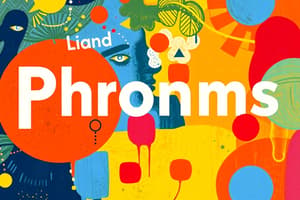Podcast
Questions and Answers
What is the primary purpose of phonics in reading?
What is the primary purpose of phonics in reading?
- To memorize the meanings of words
- To understand the context of sentences
- To learn the sounds of letters and groups of letters (correct)
- To improve vocabulary through writing
Which of the following statements about morphemes is NOT true?
Which of the following statements about morphemes is NOT true?
- Root words represent the most basic part of a word.
- Morphemes are the smallest meaningful parts of words.
- Morphemes always occur as entire words. (correct)
- Morphemes can be prefixes or suffixes.
In the pronunciation of the word 'cycle', how is the 'cy' portion pronounced?
In the pronunciation of the word 'cycle', how is the 'cy' portion pronounced?
- kay
- kuh
- si (correct)
- sih
What does the prefix 'bi-' in the word 'bicycle' imply?
What does the prefix 'bi-' in the word 'bicycle' imply?
Which is the correct breakdown of the word 'cyclops' using phonics?
Which is the correct breakdown of the word 'cyclops' using phonics?
What role does a suffix play in the word 'cycling'?
What role does a suffix play in the word 'cycling'?
What is the function of prefixes in morphemes?
What is the function of prefixes in morphemes?
How many sounds can the letter 'A' produce according to phonics?
How many sounds can the letter 'A' produce according to phonics?
What is an example of a suffix that changes the meaning of a root word?
What is an example of a suffix that changes the meaning of a root word?
Which of the following terms represents the most basic form of a word?
Which of the following terms represents the most basic form of a word?
Flashcards
Morpheme?
Morpheme?
The smallest unit of meaning in a word, like prefixes, suffixes, and root words.
What is phonics?
What is phonics?
A method for learning the sounds of letters and letter groups to read and pronounce words.
Prefix
Prefix
A part added to the beginning of a word to change its meaning, like 'pre-' in 'preheat' or 'un-' in 'unhappy'.
Root word
Root word
Signup and view all the flashcards
Suffix
Suffix
Signup and view all the flashcards
Sounding out a word
Sounding out a word
Signup and view all the flashcards
Decoding with morphemes
Decoding with morphemes
Signup and view all the flashcards
Decoding a word
Decoding a word
Signup and view all the flashcards
What does 'cycling' mean?
What does 'cycling' mean?
Signup and view all the flashcards
What is a 'bicycle'?
What is a 'bicycle'?
Signup and view all the flashcards
Study Notes
Decoding Words
-
Phonics: A method of learning letter and letter-group sounds to correctly pronounce words. Each letter can make one or more sounds.
-
Morphemes: Smallest meaningful units in words. Types include:
- Prefixes: Added before root words (e.g., "in-" in "inside," "para-" in "parachute").
- Root words: The basic part of a word.
- Suffixes: Added after root words (e.g., "-om" in "boredom").
Decoding "Cycle"
-
Phonics: "Cycle" is broken down phonetically into "si-kull." The "c" sounds like "s," "y" like "i," and "cle" like "kull."
-
Morphemes: "Cycle" can have its meaning changed by adding prefixes or suffixes. For example, adding "bi-" forms "bicycle," and adding "-ing" forms "cycling."
Decoding "Cyclops"
-
Phonics: "Cyclops" is decoded as "sy-kl-ops." The "c" sounds like "s," "y" sounds like "i," "cl" sounds like "kl," and "ops" is pronounced as expected.
-
Morphemes: "Cyclops" has the root "cycle," and the suffix "ops" meaning "eyes." The word refers to a creature with a single round eye.
Decoding "Transport"
-
Phonics: "Trans" is a prefix meaning "across" or "through." "Port" means "carry."
-
Morphemes: Putting these together, "transport" means to move something across or through (e.g., from one place to another).
Studying That Suits You
Use AI to generate personalized quizzes and flashcards to suit your learning preferences.




